超验主义和美国文学
简析美国的超验主义及其对美国社会发展的影响
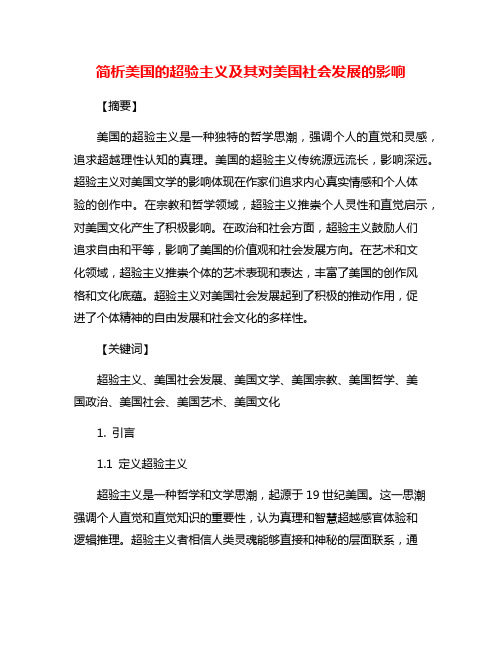
简析美国的超验主义及其对美国社会发展的影响【摘要】美国的超验主义是一种独特的哲学思潮,强调个人的直觉和灵感,追求超越理性认知的真理。
美国的超验主义传统源远流长,影响深远。
超验主义对美国文学的影响体现在作家们追求内心真实情感和个人体验的创作中。
在宗教和哲学领域,超验主义推崇个人灵性和直觉启示,对美国文化产生了积极影响。
在政治和社会方面,超验主义鼓励人们追求自由和平等,影响了美国的价值观和社会发展方向。
在艺术和文化领域,超验主义推崇个体的艺术表现和表达,丰富了美国的创作风格和文化底蕴。
超验主义对美国社会发展起到了积极的推动作用,促进了个体精神的自由发展和社会文化的多样性。
【关键词】超验主义、美国社会发展、美国文学、美国宗教、美国哲学、美国政治、美国社会、美国艺术、美国文化1. 引言1.1 定义超验主义超验主义是一种哲学和文学思潮,起源于19世纪美国。
这一思潮强调个人直觉和直觉知识的重要性,认为真理和智慧超越感官体验和逻辑推理。
超验主义者相信人类灵魂能够直接和神秘的层面联系,通过这种联系获取智慧和启示。
他们追求的是超越理性和经验的真实知识,通过直觉和感知来认识世界和自我。
在超验主义的世界观中,个人的内心和灵魂是最重要的,他们认为人类的灵魂具有无限的力量和智慧,可以直接与神秘的神性联系。
超验主义强调直觉和感知的重要性,认为通过深入的沉思和直觉体验,人类可以超越理性和经验的限制,接近真理和智慧的源泉。
超验主义是一种强调个人内在力量和直觉知识的哲学思潮,认为人类可以通过直觉和感知认识世界和自我,超越理性和经验的局限。
这种思想在19世纪美国的文学、宗教、哲学、政治、艺术和文化领域都有着深远的影响,对美国社会发展产生了重要的影响。
1.2 美国的超验主义传统美国的超验主义传统源自于19世纪初期的新英格兰地区,具有强烈的个人主义和反传统思想。
超验主义者强调个人直觉和经验,认为真理超越了理性和经验的限制。
他们主张通过直接体验自然和神秘领域来获取真知,反对社会规范和传统权威。
美国文学名词解释

American Puritanism清教主义: Puritanism is the practices and beliefs of the puritans. The Puritans were originally members of a division of the protestant church who wanted to purify their religious beliefs and practices. They accepted the doctrines of predestination, original sin and total depravity, and limited atonement through a special infusion of grace from God. American literature in the 17th century mostly consisted of Puritan literature. Puritanism had an enduring influence on American literature. It had become, to some extent, so much a state of mind, so much a part of national cultural atmosphere, rather than a set of tenets. Transcendentalism 超验主义: Transcendentalism was a group of new ideas in literature, religion, culture and philosophy that emerged in New England in the early to middle 19th century. Transcendentalists spoke for cultural rejuvenation and against the materialism of American society. It placed emphasis on spirit, or the Over soul, as the most important thing in the world. It stressed the importance of individual and offered a fresh perception nature ad symbolic of the spirit of God. Prominent transcendentalists included Ralph Waldo Emerson and Henry David Thorough. American Naturalism自然主义: American naturalism was a new and harsher realism. The naturalists attempt to achieve extreme objectivity and frankness, presenting characters of low social and economic classes who were determined by environment and heredity. It emphasized that the world was amoral, the men and women had no free will, that lives were controlled by heredity and environment, that the destiny of humanity was misery in life and oblivion in death. The pessimism and deterministic ideas naturalism pervaded the works of such American writers as Stephen Crane and Theodore Dreiser.American Naturalism(美国自然主义文学):The American naturalists accepted the more negative interpretation of Darwin’s evolutionary theory and used it to account for the behavior of those characters in literary works who were regarded as more or less complex combinations of inherited attributes, their habits conditioned by social and economic naturalism is evolved from realism when the author’s tone in writing becomes less serious and less sympathetic but more ironic and more pessimistic. It is no more than a gloomy philosophical approach to reality, or to human >Dreiser is a leading figure of his school.The Gilded Age镀金时代: the Gilded Age refers to the era of rapid economic and population growth in the United States during the post-Civil War and post-Reconstruction eras of the late 19th century. The term "Gilded Age" was coinedby Mark Twain and Charles Dudley Warner in their 1873 book, The Gilded Age: A Tale of Gilded Age is most famous for the creation of a modern industrial economy. The end of the Gilded Age coincided with the Panic of 1893, a deep depression. The depression lasted until 1897 and marked a major political realignment in the election of 1896. After that came the Progressive Era.The Lost Generation: The Lost Generation is a group of expatriate American writers residing primarily in Paris during the 1920s and 1930s. The group was given its name by the American writer Gertrude Stein, who used “a lost generation” to refer to expatriate Americans bitter about their World War I experiences and disillusioned with American society. Hemingway later used the phrase as an epigraph for his novel The Sun Also Rises. It consisted of many influential American writers, including Ernest Hemingway, F. Scott Fitzgerald, William Carlos Williams and Archibald MacLeish.The Lost Generation(迷惘的一代):The lost generation is a term first used by Stein to describe the post-war I generation of American writers:men and women haunted by a sense of betrayal and emptiness brought about by the destructiveness of the >full of youthful idealism, these individuals sought the meaning of life, drank excessively, had love affairs and created some of the finest American literature to >the three best-known representatives of lost generation are Fitzgerald, Hemingway and John dos Passos.Tragedy: in general, a literary work in which the protagonist meets an unhappy or disastrous end. Unlike comedy, tragedy depicts the actions of a central character who is usually dignified or heroic. Through a series of events, this tragic hero is brought t o a final downfall. The causes of the tragic hero’s downfall vary. In traditional dramas, the cause can be fate, a flaw in character or an error in judgment. In modern dramas, where the tragic hero is often an ordinary individual, the causes range from moral or psychological weakness to the evils of society.Catch-22第22条军规: Catch-22 is a general critique of bureaucratic operation and reasoning. Resulting from its specific use in the book, the phrase "Catch-22" is common idiomatic usage meaning "a no-win situation" or "a double bind" of any type. The term was originally from Joseph Heller’s anti novel Catch-22.Beat Generation垮掉的一代: group of American writers of the 1950s whose writing expressed profound dissatisfaction with contemporary American society and endorsed an alternative set of values. The term sometimes is used to refer to those whoembraced the ideas of these writers. The Beat Generation's best-known figures were writers Allen Ginsberg and Jack Kerouac.The Beat Generation(垮掉的一代):The members of The Beat Generation were new bohemian libertines. Who engaged in a spontaneous, sometimes messy, > The Beat writers produced a body of written work controversial both for its advocacy of non-conformity and for its non-conforming > the major beat writings are Allen Ginsberg’s became the manifesto of The Beat Generation.Psychological Realism心理现实主义: it is the realistic writing that probes deeply into the complexities of characters’ thoughts and motivations. It places more than the usual amount of emphasis on interior characterization and on the motives, and internal action which springs from and develops external action. In Psychological Realism, character and characterization are more than usually important. Henry James is considered a great master of psychological realism.Free Verse自由诗体: free verse is poetry that has an irregular rhythm and line length and that attempts to avoid any predetermined verse structure, instead, it uses the cadences of natural speech. While it alternates stressed and unstressed syllables as stricter verse form do, free verse dose so in a looser way. Walt Whitman’s poetry is an example of free verse.Confessional Poetry自白诗:it is a type of modern poetry in which poets speak with openness and frankness about their own lives, such as in poems about illness, sexuality and despondence. Robert Lowell, Sylvia Plath and Allen Ginsberg and Theodore Roethke are the most important American poets.Imagism意象派: The 1920s saw a vigorous literary activity in America. In poetry there appeared a strong reaction against Victorian poetry. Imagists placed primary reliance on the use of precise, sharp images as a means of poetic expression and stressed precision in the choice of words, freedom in the choice of subject matter and form, and the use of colloquial language. Most of the imagist poets wrote in free verse, using such devices as assonance and alliteration rather than formal metrical schemes to give structure to their movement which had these as its aims is known in literary history as Imagism. Its prime mover was Ezra Pound. Imagism(意象主义):Imagism came into being in Britain and around 1910 as a reaction to the traditional English poetry to express the sense of fragmentation and >the imagists, with Ezra Pound leading the way, hold that the most effective means to express these momentary impressions is through the use of one dominant >imagism ischaracterized by the following three poetic principles: treatment of subject matter; of expression;C. as regards rhythm ,to compose in the sequence of the musical phrase, not in the sequence of metronome. 4> pound’s In a Station of the Metro is a well-known inagist poem.Black Humor: the use of morbid and the absurd for darkly comic purposes in modern fiction and drama. The term refers as much to the tone of anger and bitterness as it does to the grotesque and morbid situations, which often deal with suffering, anxiety, and death. Black humor is a substantial element in the Anti-novel and the Theatre of Absurd. Joseph Heller's Catch-22 is an almost archetypal example. Irony: a contrast or an incongruity between what is stated and what is really meant, or between what is expected to happen and what actually happens in drama and literature. There are types of irony: verbal irony, dramatic irony and irony of situation. Irony of situation typically takes the form of a discrepancy between appearance and reality, or between what a character expects and what actually happens. Both verbal and irony of situation share the suggestion of a concealed truth conflicting with surface appearances.Allusion: A reference to a person, a place, an event, or a literary work that a writer expects the reader to recognize and respond to. An allusion may be drawn from history, geography, literature, or religion.Satire讽刺: A kind of writing that holds up to ridicule or contempt the weaknesses and wrongdoings of individuals, groups, institutions, or humanity in general. The aim of satirists is to set a moral standard for society, and they attempt to persuade the reader to see their point of view through the force of laughter.Symbol: A symbol is a sign which suggests more than its literal meaning. In other words, a symbol is both literal and figurative. A symbol is a way of telling a story and a way of conveying meaning. The best symbols are those that are believable in the lives of the characters and also convincing as they convey a meaning beyond the literal level of the story. If the symbol is obscure or ambiguous, then the very obscurity and the ambiguity may also be part of the meaning of the story. Symbolism: Symbolism is the writing technique of using symbols. It’s a literary movement that arose in France in the last half of the 19th century and that greatly influenced many English writers, particularly poets, of the 20th century. It enables poets to compress a very complex idea or set of ideas into one image or even one word. It’s one of the most powerful devices that poets employ in creation.Stream of consciousness(意识流)(or interior monologue);In literary criticism, Stream of consciousnes s denotes a literary technique which seeks to describe an individual’s point of view by giving the written equivalent of the character’s thought processes. Stream of consciousness writing is strongly associated with the modernist movement. Its introduction in the literary context, transferred from psychology, is attributed to May Sinclair. Stream of consciousness writing is usually regarded as a special form of interior monologue and is characterized by associative leaps in syntax and punctuation that can m ake the prose difficult to follow,tracing as they do a character’s fragmentary thoughts and sensory writers to employ this technique in the english language include James Joyce and William Faulkner.American realism :(美国现实主义)Realism was a reaction against Romanticism and paved the way to Modernism; 2).During this period a new generation of writers, dissatisfied with the Romantic ideas in the older generation, came up with a new inspiration. This new attitude was characterized by a great interest in the realities of life. It aimed at the interpretation of the realities of any aspect of life, free from subjective prejudice, idealism, or romantic color. Instead of thinking about the mysteries of life and death and heroic individualism, people’s attention was n ow directed to the interesting features of everyday existence, to what was brutal or sordid, and to the open portayal of class struggle;3) so writers began to describe the integrity of human characters reacting under various circumstances and picture the pioneers of the far west, the new immigrants and the struggles of the working class; 4) Mark Twain Howells and Henry James are three leading figures of the American Realism.Local Colorism(乡土文学):Generally speaking, the writings of local colorists are concerned with the life of a small, well-defined region or province. The characteristic setting is the isolated small town. 2) Local colorists were consciously nostalgic historians of a vanishing way of life, recorders of a present that faded before their eyes. Yet for all their sentimentality, they dedicated themselves to minutely accurate descriptions of the life of their regions, they worked from personal experience to record the facts of a local environment and suggested that the native life was shaped by the curious conditions of the local. 3) major local colorists is Mark Twain.A J azz age(爵士时代):The Jazz Age describes the period of the 1920s and 1930s, the years between world war I and world war II. Particularly in north America. With the rise of the great depression, the values of this age saw much decline. Perhaps the most representative literary work of the age is American writer Fitzgerald’s The Great Gatsby.Highlighting what some describe as the decadence and hedonism, as well as the growth of individu alism. Fitzgerald is largely credited with coining the term” Jazz Age”. Feminism(女权主义): Feminisim incorporates both a doctrine of equal rights for women and an ideology of social transformation aiming to create a world for women beyond simple social >in ge neral, feminism is ideology of women’s liberation based on the belief that women suffer injustice because of their sex. Under this broad umbrella various feminisms offer differing analyses of the causes, or agents, of female > definitions of feminism by feminists tend to be shaped by their training, ideology or race. So, for example, Marxist and socialist feminists stress the interaction within feminism of class with gender and focus on social distinctions between men and women. Black feminists argue much more for an integrated analysis which can unlock the multiple systems of oppression. Hemingway Code Hero(海明威式英雄): Hemingway Code Hero ,also called code hero, is one who, wounded but strong more sentitive, enjoys the pleasures of life( sex, alcohol, sport) in face of ruin and death, and maintains, through some notion of a code, an ideal of > barnes in the sun also Rises, henry in a Farewell to arms and santiago in the old man and the sea are typical of Hemingway Code HeroImpressionism(印象主义):Impressionism is a style of painting that gives the impression made by the subject on the artist without much attention to details. Writers accepted the same conviction that the personal attitudes and moods of the writer were legitimate elements in depicting character or setting or >briefly, it is a style of literature characterized by the creation of general impressions and moods rather that realistic mood.Modernism(现代主义):Modernism is comprehensive but vague term for a movement , which begin in the late 19th century and which has had a wide influence internationally during much of the 20th > modernism takes the irrational philosophy and the theory of psycho-analysis as its theoretical > the term pertains to all the creative arts. Especially poetry, fiction, drama, painting,music and > in england from early in the 20th century and during the 1920s and 1930s, in America from shortly before the first world war and on during the inter-war period, modernist tendencies were at their most active and >as far as literature is concerned, Modernism reveals a breaking away from established rules, traditions and ways of looking at man’s position and function in the universe and many experiments in form and is particularly concerned with language and how to use it and with writing itself.the gilded age: Plains Indians were pushed in a series of Indian wars onto restrictedperiod also witnessed the creation of a modern industrial economy. A national transportation and communication network was created, the corporation became the dominant form of business organization, and a managerial revolution transformed business operations. By the beginning of the twentieth century, per capita income and industrial production in the United States exceeded that of any other country except Britain. Long hours and hazardous working conditions, led many workers to attempt to form labor unions despite strong opposition from industrialists and the era of intense political partisanship, the Gilded Age was also an era of reform. The Civil Service Act sought to curb government corruption by requiring applicants for certain governmental jobs to take a competitive examination. The Interstate Commerce Act sought to end discrimination by railroads against small shippers and the Sherman Antitrust Act outlawed business monopolies. These years also saw the rise of the Populist crusade. Burdened by heavy debts and falling farm prices, many farmers joined the Populist party, which called for an increase in the amount of money in circulation, government assistance to help farmers repay loans, tariff reductions, and a graduated income Twain called the late nineteenth century the "Gilded Age." By this, he meant that the period was glittering on the surface but corrupt underneath. In the popular view, the late nineteenth century was a period of greed and guile: of rapacious Robber Barons, unscrupulous speculators, and corporate buccaneers, of shady business practices, scandal-plagued politics, and vulgar display. It is easy to caricature the Gilded Age as an era of corruption, conspicuous consumption, and unfettered capitalism. But it is more useful to think of this as modern America’s formative period, when an agrarian society of small producers was transformed into an urban society dominated by industrial corporations.Regionalism(地区主义):In literature, regionalism or local color fiction refers to fiction or poetry that focuses on specific features –including characters, dialects, customs, history, and topography – of a particular region. Since the region may be a recreation or reflection of the author's own, there is often nostalgia and sentimentality in the the terms regionalism and local color are sometimes used interchangeably, regionalism generally has broader connotations. Whereas local color is often applied to a specific literary mode that flourished in the late 19th century, regionalism implies a recognition from the colonial period to the present of differences among specific areas of the country. Additionally, regionalism refers to an intellectual movement encompassing regional consciousness beginning in the 1930s. Even though there isevidence of regional awareness in early southern writing—William Byrd's History of the Dividing Line, for example, points out southern characteristics—not until well into the 19th century did regional considerations begin to overshadow national ones. In the South the regional concern became more and more evident in essays and fiction exploring and often defending the southern way of life. John Pendleton Kennedy's fictional sketches in Swallow Barn, for example, examined southern plantation life at length.multiple points of view(多视角):Multiple Point of View: It is one of the literary techniques William Faulkner used, which shows within the same story how the characters reacted differently to the same person or the same situation. The use of this technique gave the story a circular form wherein one event was the center, with various points of view radiating from it. The multiple points of view technique makes the reader recognize the difficulty of arriving at a true judgment.Confessional poetry :Confessional poetry emphasizes the intimate, and sometimes unflattering, information about details of the poet's personal life, such as in poems about illness, sexuality, and despondence. The confessionalist label was applied to a number of poets of the 1950s and 1960s. John Berryman, Allen Ginsberg, Robert Lowell, Sylvia Plath, Theodore Roethke, Anne Sexton, and William De Witt Snodgrass have all been called 'Confessional Poets'. As fresh and different as the work of these poets appeared at the time, it is also true that several poets prominent in the canon of Western literature, perhaps most notably Sextus Propertius and Petrarch, could easily share the label of "confessional" with the confessional poets of the fifties and sixties. Ecocriticism:Ecocriticism is the study of literature and environment from an interdisciplinary point of view where all sciences come together to analyze the environment and brainstorm possible solutions for the correction of the contemporary environmental situation. Ecocriticism was officially heralded by the publication of two seminal works, both published in the mid-1990s: The Ecocriticism Reader, edited by Cheryll Glotfelty and Harold Fromm, and The Environmental Imagination, by Lawrence the United States, Ecocriticism is often associated with the Association for the Study of Literature and Environment (ASLE), which hosts biennial meetings for scholars who deal with environmental matters in literature. ASLE has an official journal—Interdisciplinary Studies in Literature and Environment (ISLE)—in which much of the most current American scholarship in the rapidly evolving field of ecocriticism can be is an intentionally broad approach that is known by a number of other designations, including "green (cultural) studies", "ecopoetics", and "environmental literarycriticism".Dramatic Conflict:At least not the special kind of conflict that drives plays, the gas that fuels the dramatic engine. Arguments in real life are usually circular -- nobody gets anywhere, except a little steam's been blown off. And they're boring for everyone except the folks doing the Conflict draws from a much deeper vein, rooted in the Subtext of your central characters. It's driven by fundamentally opposing is a necessary element of fictional literature. It is defined as the problem in any piece of literature and is often classified according to the nature of the protagonist or antagonist。
美国文学名词解释

1. Transcendentalism—it is a philosophic and literary movement that flourish in New England, as a reaction against rationalism and Calvinism. It stressed intuitive understanding of god without the help of the church, and advocated independence of the mind. 超验主义,它是一个蓬勃发展的新英格兰的哲学和文学运动,反对理性主义和加尔文主义的反应。
它强调直观地了解上帝没有教会的帮助下,主张心灵的独立性。
2. Romanticism had appeared in England in the last years of the eighteenth century. It spread to conti nental Europe and then came to America early in the nineteenth century. It came into being as a re action against the prevailing neoclassical spirit and rationalism during the Age of Reason. 浪漫主义曾经出现在英国,在过去几年的十八世纪。
它蔓延到欧洲大陆,然后来到美国在十九世纪初。
它应运而生作为理性的时代中针对当时新古典主义精神和理性的反应。
3. Puritanism—it is the religious belief of the Puritans, who had intended to purify and simplify the religious ritual of the Church of England. 清教主义,它是清教徒,谁曾打算净化和简化英国教会的宗教礼仪的宗教信仰。
美国浪漫主义 超验主义
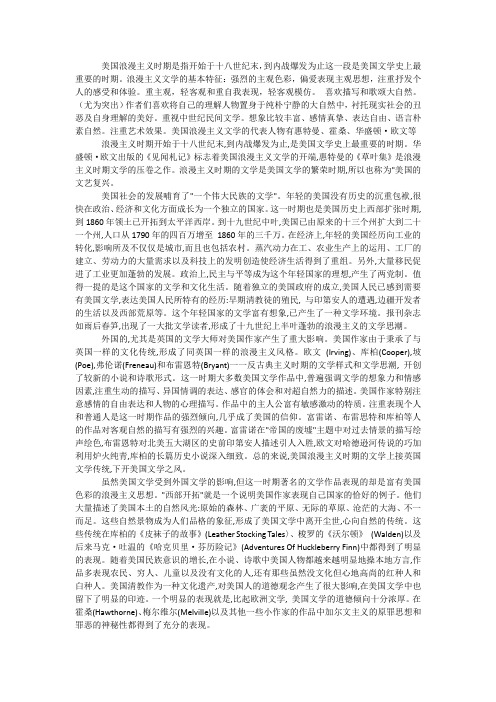
美国浪漫主义时期是指开始于十八世纪末,到内战爆发为止这一段是美国文学史上最重要的时期。
浪漫主义文学的基本特征:强烈的主观色彩,偏爱表现主观思想,注重抒发个人的感受和体验。
重主观,轻客观和重自我表现,轻客观模仿。
喜欢描写和歌颂大自然。
(尤为突出)作者们喜欢将自己的理解人物置身于纯朴宁静的大自然中,衬托现实社会的丑恶及自身理解的美好。
重视中世纪民间文学。
想象比较丰富、感情真挚、表达自由、语言朴素自然。
注重艺术效果。
美国浪漫主义文学的代表人物有惠特曼、霍桑、华盛顿·欧文等浪漫主义时期开始于十八世纪末,到内战爆发为止,是美国文学史上最重要的时期。
华盛顿·欧文出版的《见闻札记》标志着美国浪漫主义文学的开端,惠特曼的《草叶集》是浪漫主义时期文学的压卷之作。
浪漫主义时期的文学是美国文学的繁荣时期,所以也称为"美国的文艺复兴。
美国社会的发展哺育了"一个伟大民族的文学"。
年轻的美国没有历史的沉重包袱,很快在政治、经济和文化方面成长为一个独立的国家。
这一时期也是美国历史上西部扩张时期,到1860年领土已开拓到太平洋西岸。
到十九世纪中叶,美国已由原来的十三个州扩大到二十一个州,人口从1790年的四百万增至1860年的三千万。
在经济上,年轻的美国经历向工业的转化,影响所及不仅仅是城市,而且也包括农村。
蒸汽动力在工、农业生产上的运用、工厂的建立、劳动力的大量需求以及科技上的发明创造使经济生活得到了重组。
另外,大量移民促进了工业更加蓬勃的发展。
政治上,民主与平等成为这个年轻国家的理想,产生了两党制。
值得一提的是这个国家的文学和文化生活。
随着独立的美国政府的成立,美国人民已感到需要有美国文学,表达美国人民所特有的经历:早期清教徒的殖民, 与印第安人的遭遇,边疆开发者的生活以及西部荒原等。
这个年轻国家的文学富有想象,已产生了一种文学环境。
报刊杂志如雨后春笋,出现了一大批文学读者,形成了十九世纪上半叶蓬勃的浪漫主义的文学思潮。
美国文学中的几个主义
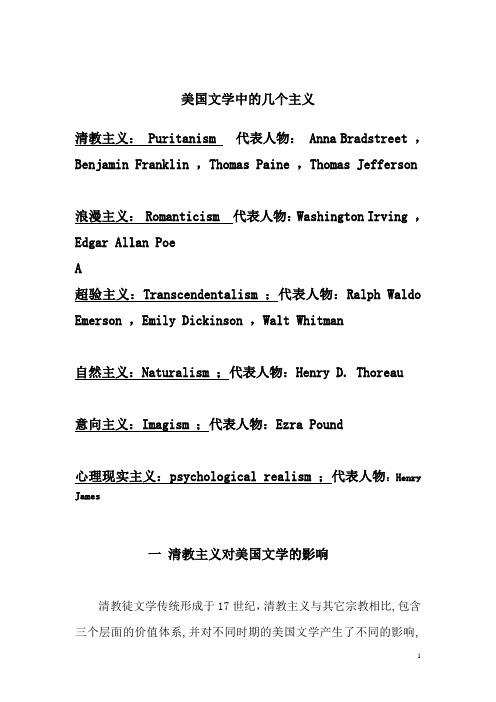
美国文学中的几个主义清教主义: Puritanism 代表人物: Anna Bradstreet ,Benjamin Franklin ,Thomas Paine ,Thomas Jefferson浪漫主义: Romanticism 代表人物:Washington Irving ,Edgar Allan PoeA超验主义:Transcendentalism ;代表人物:Ralph Waldo Emerson ,Emily Dickinson ,Walt Whitman自然主义:Naturalism ;代表人物:Henry D. Thoreau意向主义:Imagism ;代表人物:Ezra Pound心理现实主义:psychological realism ;代表人物:Henry James一清教主义对美国文学的影响清教徒文学传统形成于17世纪,清教主义与其它宗教相比,包含三个层面的价值体系,并对不同时期的美国文学产生了不同的影响,表现出不同时代特征,以清教主义作为参照系,可以说17世纪美国文学是“信仰时代的文学”,18世纪美国文学是“世俗时代的文学”,19世纪美国文学则可称为“宗教批判与宗教道德时代的文学”。
发端于英国的清教主义对美国社会有着更大的影响,“英格兰有过清教革命,却没有创建清教社会;美国没有经历清教革命,却创建了清教社会”①。
并且这种影响以其持久深厚而铸就了美利坚民族的灵魂。
正如朱世达先生所言:“清教传统像一条红线规范了从殖民时代到如今的美国的政治文化与社会文化”②。
作为美国文化一个独特的源头,清教主义在美国经历了由表及里、由明转暗的曲折发展,最终形成有美国特色的清教价值体系,从某种意义上说,文学是这一发展历程的最好见证。
一般而言,宗教都包含信仰与道德两个层面的价值体系。
清教主义的传播和渗入伴随着早期的移民拓荒、定居北美的整个过程。
作为一种教义 ,清教主义不再具有原有的意义 ,但它对新英格兰乃至整个美国由来已久的影响 ,却在美国形成了一种特殊的文化氛围 ,不仅与美国人性格中的个人主义有联系 ,对美国文学的发展和特点也起着重要作用。
美国文学特点
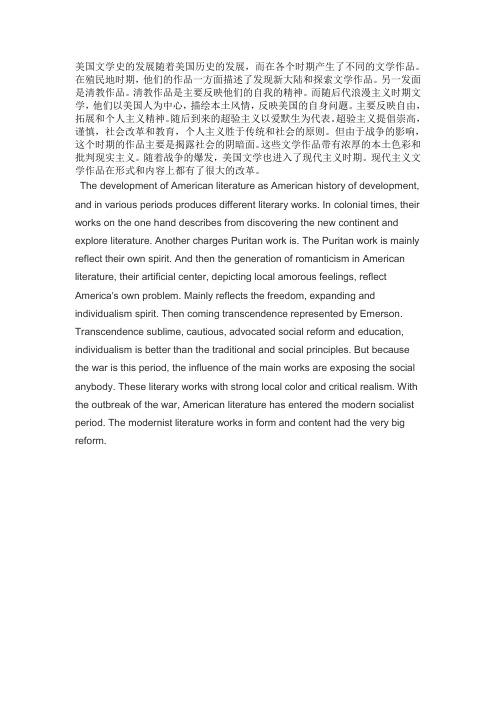
美国文学史的发展随着美国历史的发展,而在各个时期产生了不同的文学作品。
在殖民地时期,他们的作品一方面描述了发现新大陆和探索文学作品。
另一发面是清教作品。
清教作品是主要反映他们的自我的精神。
而随后代浪漫主义时期文学,他们以美国人为中心,描绘本土风情,反映美国的自身问题。
主要反映自由,拓展和个人主义精神。
随后到来的超验主义以爱默生为代表。
超验主义提倡崇高,谨慎,社会改革和教育,个人主义胜于传统和社会的原则。
但由于战争的影响,这个时期的作品主要是揭露社会的阴暗面。
这些文学作品带有浓厚的本土色彩和批判现实主义。
随着战争的爆发,美国文学也进入了现代主义时期。
现代主义文学作品在形式和内容上都有了很大的改革。
The development of American literature as American history of development, and in various periods produces different literary works. In colonial times, their works on the one hand describes from discovering the new continent and explore literature. Another charges Puritan work is. The Puritan work is mainly reflect their own spirit. And then the generation of romanticism in American literature, their artificial center, depicting local amorous feelings, reflect America's own problem. Mainly reflects the freedom, expanding and individualism spirit. Then coming transcendence represented by Emerson. Transcendence sublime, cautious, advocated social reform and education, individualism is better than the traditional and social principles. But because the war is this period, the influence of the main works are exposing the social anybody. These literary works with strong local color and critical realism. With the outbreak of the war, American literature has entered the modern socialist period. The modernist literature works in form and content had the very big reform.摘要:20世纪为美国文学的空前繁荣和发展提供了充分的时间和空间,该文从背景,美国文学创作主题,社会文化和思想等反面展示了20世纪美国文学发展的主体特征——多元化。
美国文学第5周超验主义

The Summit of American Romanticism
Transcendentalism
• (1) • (2) • (3) • (4)
Definition Features Influences Representatives
Emerson’s Point of View
“the infinitude of man” firmly believes in the transcendence of the “ oversoul ” regards nature as the purest, and the most sanctifying moral influence on man.
Ralph Waldo Emerson (1803----1882)
~~went to Europe, and met Coleridge, Carlyle and Wordsworth and made friends with them, and brought back the influence of European Romanticism.
2.regards nature as the purest, and the most sanctifying moral influence on man ~~Nature as symbolic of God. ~~In the eyes of Emerson, “nature is the vehicle of thought,” and “particular natural facts are symbols of particular spiritual facts”. Thus everything bears a secondary and an ulterior隐秘的 sense. A flowing river indicates the ceaseless motion of the universe. The seasons correspond to the life span of man. The ant is the image of man himself, small in body but mighty in heart.
南开大学 外国语学院 美国文学课件 美国文学史4(超验主义)
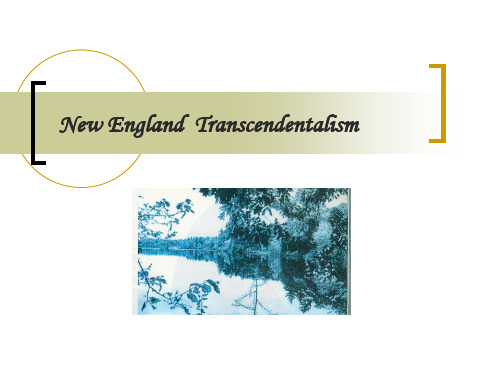
Important terms (1)
Although transcendentalism was never a rigorously systematic philosophy, it had some basic tenets that were generally shared by its adherents. The beliefs that God is immanent in each person and in nature每人都有内在的神性 and that individual intuition is the highest source of knowledge led to an optimistic emphasis on individualism, self-reliance, and rejection of traditional authority.
社会和谐发展。
Important terms (3)
American Renaissance : The name is given to a flourishing of distinctively American literature in the period before the Civil War. This renaissance is represented by the work of Ralph Waldo Emerson, H. D. Thoreau, Nathaniel Hawthorne, Herman Melville, and Walt Whitman.
Important terms (2)
Individualism claims the ability to oppose "authority" 宣扬有能力与“权威”对抗, and to all manner of controls over the individual 反对一 切压抑个人的支配行为, especially when exercised by the political state or "society". It is thus directly opposed to collectivism 集体 主义, social psychology and sociology, which consider the individual's rapport to the society or community集体主义强调个人应注意与
Emerson-Transcendentalism常耀信-美国文学-超验主义.爱默生PPT课件

(a new way of looking at man)
•7
Features
nature is the symbol of spirit/the garment of the Oversoul
• Nature was alive, filled with God’s overwhelming presence. The physical world was a symbol of the spiritual.
• Spirit / Oversoul is the most important thing in the universe.
•It exists in nature and man alike and constituted the universe. •It is omnipresent (present everywhere) and omnipotent (able to do anything)
a. In Emerson's opinion, poets should function as preachers who gave directions to the mass. b. True poetry should serve as a moral purification c. The argument (or his thought or experience) should decide the form of the poem instead of traditional techniques.
•11
Transcendentalism: quotes
“Standing on the bare ground, -my head bathed by the blithe air, and uplifted into infinite space, -all mean egotism vanishes. I become a transparent eye-ball.”
19世纪美国文学

烘托渲染与对比衬托:用略带神秘色彩的自然景象 烘托环境,渲染气氛,如密林见面,夜晚刑台。对 比是成组的,如贝灵汉总督、威尔逊牧师、西宾斯 老夫人等和珠儿、牧师、罗杰· 齐灵握斯和海丝特四 个主要人物形成对比反衬。
三、惠特曼(1819-1892) 生于美国东部长岛亨廷顿区西山村一木匠家庭。 读过小学,后自谋生活,当过帮工、印刷厂学徒 和排字工、报纸编辑。
1、《红字》(1850)背景 1650年前后的波士顿,居民是1620-30年间来此定居 的第一代移民,即清教徒(加尔文教)。他们在英格 兰受詹姆斯一世迫害,抱着创建人间乐土的理想来 新大陆,史称“朝圣的教父”。英国清教徒最初反 抗罗马教皇专制、反对社会腐败风气,注重理智, 排斥感情,推崇理想,禁绝欲望,后来发展到极端: 迫害异端,不准妇女在街上微笑,不准儿童嬉戏。
诗歌《乌鸦》是成名作,写失去亲人的男子深夜与 一只乌鸦邂逅,调子阴郁而忧伤。 恐怖小说有《厄舍古屋的倒塌》、《黑猫》 、《红 死魔的面具》,情节诡异,色彩浓丽,情绪压抑。 侦探小说有《毛格街的谋杀案》《失窃的信》、 《金甲虫》,表现出非理性幻想与推理能力的矛盾。
二、霍桑(1804一1864)
生于马萨诸塞州萨勒姆镇,家庭是新英格兰一名门 望族,世代加尔文教信徒。先祖曾是马萨诸塞殖民 地政教合一机构要人。他自幼为人阴郁,耽于思考, 自比窥探的保罗;而祖先对异端的迫害又使他
3、R· 爱默生(1803-82) W· 散文作家、思想家、诗人,近代“美国文艺复兴” 的旗手。出身牧师家庭,入哈佛神学院任牧师并布 道。1832年游欧结识华滋华斯和柯勒律治,接受超 验论。回波士顿后在康考德布道、演说,演讲汇编 成著名的《论文集》,其演讲辞《美国学者》 (1837)宣告美国文学脱离英国文学而独立。
美国文学期末复习笔记 (1)
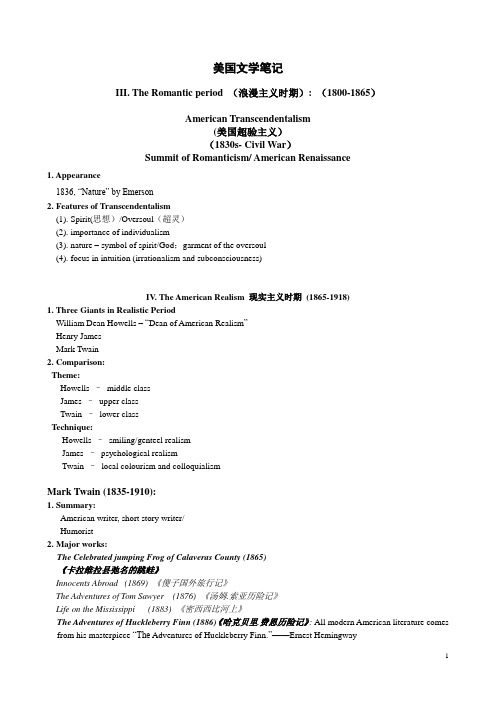
美国文学笔记III. The Romantic period (浪漫主义时期): (1800-1865)American Transcendentalism(美国超验主义)(1830s- Civil War)Summit of Romanticism/ American Renaissance1. Appearance1836, ―Nature‖ by Emerson2. Features of Transcendentalism(1). Spirit(思想)/Oversoul(超灵)(2). importance of individualism(3). nature – symbol of spirit/God;garment of the oversoul(4). focus in intuition (irrationalism and subconsciousness)IV. The American Realism 现实主义时期(1865-1918)1. Three Giants in Realistic PeriodWilliam Dean Howells –―Dean of American Realism‖Henry JamesMark Twain2. Comparison:Theme:Howells –middle classJames –upper classTwain –lower classTechnique:Howells –smiling/genteel realismJames –psychological realismTwain –local colourism and colloquialismMark Twain (1835-1910):1. Summary:American writer, short story writer/Humorist2. Major works:The Celebrated jumping Frog of Calaveras County (1865)《卡拉维拉县弛名的跳蛙》Innocents Abroad (1869) 《傻子国外旅行记》The Adventures of Tom Sawyer (1876) 《汤姆.索亚历险记》Life on the Mississippi (1883) 《密西西比河上》The Adventures of Huckleberry Finn (1886)《哈克贝里.费恩历险记》: All modern American literature comes from his masterpiece ―The Adventures of Huckleberry Finn.‖——Ernest Hemingway3. Style:(1). colloquial language(口语), vernacular (本土的)language, dialects(2). local colour(3). syntactic feature: sentences are simple, brief, and sometimes ungrammatical(4). humour(5). tall tales (highly exaggerated) (荒诞不经的故事)(6). social criticism (satire on the different ugly things in society)4. ContributionOne of Mark Twain’s significant contributions to American literature lies in the fact that he made colloquial speech an accepted, respectable literary medium in the literary history of the country.Henry James (1843-1916)1. Summary:An American and British novelist, literary criticFounder of psychological realismFirst of the modern psychological novelistInitiator of the international theme: American innocence in face of European sophistication2. Major works:Daisy Miller (1878)《戴茜·米勒》The Portrait of a Lady (1881) 《贵妇的肖像》The Wings of the Dove (1902)《鸽翼》The Ambassadors (1903)《专使》The Golden Bowl (1904)《金碗》The Art of Fiction(1884)《小说的艺术》3. His Point of view(1). Psychological analysis, forefather of stream of consciousness(2).Psychological realism(3). Highly-refined language4. Style –“stylist”(1). Language: highly-refined, polished, insightful, and accurate(2).V ocabulary: large(3). Construction: complicated, intricateNaturalism(自然主义)1. Background:(1). Dar win’s theory: ―natural selection‖(2).Spenser’s idea: ―social Darwinism‖(3). French Naturalism: Zora2. Features(1). environment and heredity(2). scientific accuracy and a lot of details(3). general tone: ironic and pessimistic, hopelessness, despair, gloom, ugly side of the societySt ephen Crane (1881-1900)1. Summary:Novelist, poetPioneer in the naturalistic traditionPrecursors(先驱)of Imagist poetry2. Major Works:Maggie: A Girl of the Streets 《街头女郎麦姬》: the first naturalistic novel in AmericaThe Red Badge of Courage 《红色英勇勋章》The Open Boat《海上扁舟》V. AMERICAN MODERNISM (1918-1945)(美国现代主义)F. Scott Fitzgerald (1896-1940)1. Summary:Famous American novelist, short story writer, and essayistthe representative of the 1920sthe spokesman for the Jazz Ageone of the“lost generation”writers2. Major WorksThis Side of Paradise (1920) 《人间天堂》Tales of the Jazz Age (1922) 《爵士乐时代的故事》Tender Is the Night (1934) 《夜色温柔》The Great Gatsby (1925) 《了不起的盖茨比》:Narrative point of view – Nick CarrawayTheme: The decline of the American Dream3. His Point of view(1). He expressed what the young people believed in the 1920s, the so-called ―American Dream‖ is false innature.(2). He had always been critical of the rich and tried to show the integrating effects of money on theemotional make-up of his character. He found that wealth altered people’s characters, making them mean and distrusted. He thinks money brought only tragedy and remorse.(3). His novels follow a pattern: dream – lack of attraction – failure and despair.4. His ideas of “American Dream”It is false to most young people. Only those who were dishonest could become rich.William Faulkner (1897-1962)1. Sumary:An American novelist and poetInitiator of American Southern RenaissanceOne of the most influential modern novelists of 20th centuryNobel Prize winner for literature in 19492. Major Works:The Sound and the Fury 《喧哗与骚动》As I Lay Dying 《在我弥留之际》Light in August 《八月之光》Absalom, Absalom 《押沙龙,押沙龙!》Go Down, Moses 《去吧,摩西》Barn Burning 《烧牲口棚》Yoknapatawpha County(约克纳帕塔法县):--- A fictional county in northern Mississippi, the setting for most of William Faulkner’s novels and short stories, and patterned upon Faulkner’s actual home in Lafayette County, Mississippi.3. Major Themes of his Works(1). history and race(2). Deterioration(3). Conflicts between generations, classes, races, man and environment(4). Horror, violence and the abnormal4. Faulkner's narrative technique(1).Withdrawal of the author as a controlling narrator(2). Dislocation of the narrative time: The most characteristic way of structuring his stories is to fragment thechronological time.(3). the modern stream-of-consciousness(意识流)technique and the interior monologue(内心独白):(4). Multiple points of view(多重视角)(5). symbolism and mythological and biblical(圣经的)allusionsErnest Hemingway (1899—1961)1. Summary:Novelist and short-story writerOne of the great American writers of the 20th centuryThe Spokesman of the ―Lost Generation‖Nobel Prize winner for literature in 19542. Major worksThe Sun Also Rises 《太阳照常升起》A Farewell to Arms《永别了,武器》For Whom the Bell Tolls 《丧钟为谁而鸣》/ 《战地钟声》The Old Man and the Sea 《老人与海》A Clean, Well-lighted Place 《一个干净,明亮的地方》3. Major Themes(1).The ―Nada‖(虚无) Concept(2).Grace under pressure(压力下的优雅)―Man is not made for defeats. A man can be destroyed but not defeated.‖------The Old Man and the Sea(3). Code Hero(准则英雄/ 硬汉)a. The Hemingway hero is not a thinker; he is a man of action.b.―Grace under pressure is their motto.c.The Hemingway code heroes are best remembered for their indestructible(不可毁灭的)spirit.4. Artistic features(1) .The iceberg(冰山)techniqueThe dignity of movement of an ice-berg is due to only one-eighth of it being above water.(2). Language stylea. simple and naturalb.direct, clear and freshc. lean and economicald.simple, conversational, common found, fundamental wordse. simple sentencesf. Iceberg principle: understatement, implied thingsg.SymbolismEzra Pound (1885—1972)1. Summary:A leading spokesman of the ―Imagist Movement‖(意象主义运动)One of the most influential American poets and critic2. Major works:Cathay:《华夏集》《神州集》《中国诗章》Hugh Selwyn Mauberley《休·赛尔温·毛伯利》Cantos /《诗章》3. Imagism (1909-1917)(1) .Background:Imagism was influenced by French symbolism, ancient Chinese poetry and Japaneseliterature ―haiku‖(2). Defintion : The imagists, with Ezra Pound leading the way, hold that the most effective means to expressthe these momentary impressions is through the use of one dominant image.(3): Manifesto of Imagism:•Direct treatment•Economy of expression•New rhythmIn a station of the Metro《在一个地铁站》: a quintessential(典型的)imagist textRobert Frost(1847-1963)1. Summary:the most popular American poetWon Pulitzer Prize four timesReceived honorary degrees from forty-four colleges and universitiesRead ― The Gift Outright‖ at the inauguration of President John F. Kennedy in 19612. Famous Poems:F ire and Ice《火与冰》The Road Not Taken 《未选择的路》Stopping by Woods on a Snowy Evening 《雪夜伫立林边有感》Mending Wall《补墙》After Apple-Picking《摘罢苹果》3. Frost’s writing featureHis combination of the traditional verse pattern and a colloquial distinctive language (New England Speech)Eugene O’Neil (1888-1953)1. Summary:America's greatest playwrightWon the Pulitzer Prize four timesWon Nobel Prize in 1936Founder of the American drama2. Major WorksBeyond the Horizon (1920) 《天边外》The Emperor Jones(1920) 《琼斯皇帝》The Hairy Ape (1922)《毛猿》Desire under the Elms (1924) 《榆树下的欲望》美国文学笔记整理完整版18世纪末-19世纪中后浪漫主义时期Romanticism1. 早期浪漫主义华盛顿·欧文美国文学之父father of American Literature(为美国文学第一次赢得世界声誉)Washington Irving 以笔记小说和历史传厅闻名,humor1783-1859 The Sketch Book见闻札记(标志浪漫主义开始)A History of New York纽约史---美国人写的第一部诙谐文学杰作;----The Legend of Sleepy Hollow睡谷的传说---成为美国第1个获国际声誉作家-----Rip Van Winkle里普·万·温克尔(李伯大梦)The Alhambra阿尔罕伯拉2.超验主义New England Transcendentalism埃德加·爱伦·坡侦探小说之父Father of western detective stories and psychoanalytic criticism精神批Edgar Allan Poe 评,首开近代侦探小说先河,又是法国象征主义运动的源头1809-1849 Novelist小说家, poet, critic批评家good at writing Gothic(哥特式)and detective fictionPoetryThe Raven《乌鸦》To Helen《献给海伦》Short storiesHorror ( suspense, terror, Insanity, death,Revenge and rebirth)The Fall of the House of Usher《厄舍古屋的倒塌》The Masque of the Red Death 《红色死亡的化妆舞会》The Black Cat《黑猫》The Cask of Amontillado《一桶白葡萄酒》Ligeia《丽姬娅》Detective /ratiocinative(推理的)(originator)The Purloined Letter 《窃信案》The Muder in the Rue Morgue 《莫格街谋杀案》The Mystery of Marie Rog《玛丽.罗热疑案》The Gold Bug 《金甲虫》拉尔夫·沃尔多·爱默生Nature论自然-----新英格兰超验主义者的宣言书manifestoRalf Waldo Emerson The American Scholar论美国学者;American essayist,lecturer, poetThe Founder of Transcendentalism1803-1882 Self-reliance论自立The Transcendentalist超验主义者Representative Men代表人物School Address神学院演说Days日子-首开自由诗之先河free verseRalph Waldo Emerson was an American philosopher, essayist, and poet, best remembered for leading the Transcendentalist movement of the mid-19th century. He was seen as a champion of individualism个人主义.纳撒尼尔·霍桑subject: human soul first great American writer of fiction 虚构Nathaniel Hawthorne 象征主义大师American novelist and short story writer1804-1864 The Scarlet Letter红字Twice-told Tales尽人皆知的故事Mosses from an Old Manse古屋青苔The House of the Seven Gables有七个尖角阁的房子The Marble Faun玉石雕像The Blithedale Romance福谷传奇Young Goodman Brown年轻的布朗The Birthmark胎记His point of view : Hawthorne is influenced by Puritanism(清教主义)deeply.(1). Evil is at the core of human life 邪恶是人类生活的中心(2).whenever there is sin 罪恶, there is punishment 惩罚. Sin or evil can be passed from generation to generation 代代相传(3). Evil educates. 邪恶的教育(4). He has disgust in science科学. One source of evil is overweening (自负的) (too proud of oneself) intellect . His intellectual characters聪明的特征are villains反派角色, dreadful可怕的and cold-blooded冷血的赫尔曼·迈尔维尔擅长航海奇遇和异域风情Herman Melville Moby Dick/The White Whale白鲸(first American prose epic史诗)1819-1891 Main characters: Ishmael(以实玛利): the narrator 叙述者Ahab(埃哈伯): the protagonist 主要人物Moby DickTypee泰比Omoo奥穆Mardi玛地White Jacket白外衣Pierre皮尔埃; Billy Budd比利·巴德沃尔特·惠特曼Father of free verse自由诗之父Walt Whitman Leaves of Grass草叶集(the birth of truly American poetry and the1819-1892 end of romanticism)共和圣经Democratic Bible 美国史诗American EpicAmerican poet, essayist散文家, journalist新闻工作者, and humanist人道主义学家The father of free verse(自由诗)Song of Myself自我之歌Democratic Vistas 民主的前景One’s Self I Sing 《我歌唱一个人的自己》O Captain! My Captain! 《噢,我的船长!我的船长!》3.Writing themes (almost everything):equality of things and beings 平等的事情和人divinity 神学of everythingImmanence(无所不在)of GodDemocracy 民主evolution of cosmos(宇宙的演化)multiplicity 多样性of natureself-reliant spirit 自力更生的精神death, beauty of deathexpansion of America 美国的扩张brotherhood 手足情谊and social solidarity(社会团结)(unity of nations in the world世界统一的国家) pursuit 追求of love and happiness4.S tyle: “free verse(自由诗): the verse that does not follow a fixed metrical pattern固定的韵律模式, the verse without a fixed beat 固定的节拍or regular rhyme scheme规律的格律.(1).Parallelism(排比)(2).phonetic recurrence(同字起句法)(the repetition重复of words or phrases at the beginning of the line, inthe middle or at the end)(3).the use of a certain pronoun ―I‖ (the first person narrator)(4).strong tendency to use oral English使用英语口语的强烈倾向(5).the habit of using snapshots 生活小照(6).a looser and more open-ended syntactic structure语法结构(7).use of conventional image 传统的想象(8).vocabulary – powerful, colourful, rarely used words of foreign origins, some even wrong(9). sentences – catalogue目录technique: long list of names, long poem lines5. Significance of Leaves of GrassLeaves of Gras s, either in content or in form, is an epoch-making work in American literature:无论是在内容还是在形式上,是一个划时代的作品在美国文学→Its democratic content marked the shift from Romanticism to Realism. 其民主内容标志着从浪漫主义到现实主义的转变→Its free-verse form broke from old poetic conventions to open a new way for American poetry.其生发的形式从旧的诗意的约定了打开新的思路对美国诗歌。
美国文学-超验主义
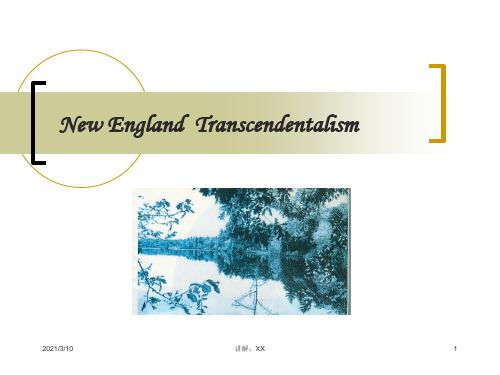
The Transcendentalists like Emerson and Thoreau were telling people to depend upon themselves for spiritual perfection if they cared to make the effort because, in their opinion, the individual soul communed with the Oversoul and was therefore divine. Now this new notion of the individual and his importance represented, obviously, a new way of looking at man.
Its major works are Hawthorne’ s The Scarlet Letter ( 红字,1850 ) , Melville ‘s Moby-Dick (白鲸, 1851 ) ,and Whitman’s Leaves of Grass (草叶集, 1855). The American Renaissance may be regarded as a delayed manifestation of Romanticism(浪漫主义的延续), especially in Emerson’ s philosophy of Transcendentalism.
2021/3/10
讲解:XX
7
Important terms (3)
American Renaissance : The name is given to a flourishing of distinctively American literature in the period before the Civil War. This renaissance is represented by the work of Ralph Waldo Emerson, H. D. Thoreau, Nathaniel Hawthorne, Herman Melville, and Walt Whitman.
超验主义及代表人物
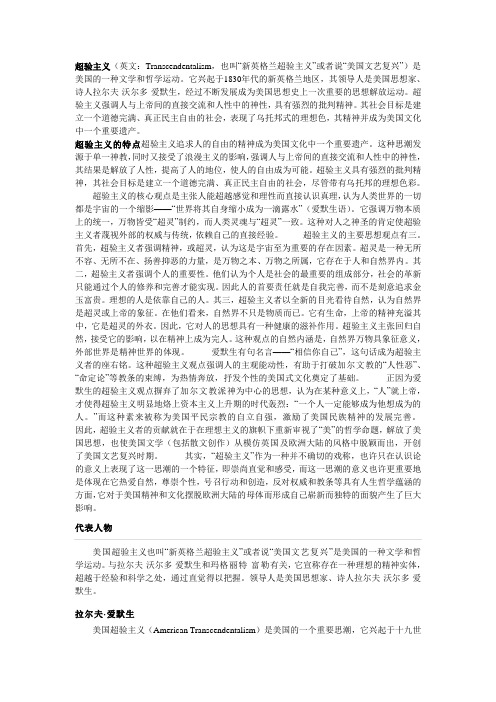
超验主义(英文:Transcendentalism,也叫“新英格兰超验主义”或者说“美国文艺复兴”)是美国的一种文学和哲学运动。
它兴起于1830年代的新英格兰地区,其领导人是美国思想家、诗人拉尔夫·沃尔多·爱默生,经过不断发展成为美国思想史上一次重要的思想解放运动。
超验主义强调人与上帝间的直接交流和人性中的神性,具有强烈的批判精神。
其社会目标是建立一个道德完满、真正民主自由的社会,表现了乌托邦式的理想色,其精神并成为美国文化中一个重要遗产。
超验主义的特点超验主义追求人的自由的精神成为美国文化中一个重要遗产。
这种思潮发源于单一神教,同时又接受了浪漫主义的影响,强调人与上帝间的直接交流和人性中的神性,其结果是解放了人性,提高了人的地位,使人的自由成为可能。
超验主义具有强烈的批判精神,其社会目标是建立一个道德完满、真正民主自由的社会,尽管带有乌托邦的理想色彩。
超验主义的核心观点是主张人能超越感觉和理性而直接认识真理,认为人类世界的一切都是宇宙的一个缩影——“世界将其自身缩小成为一滴露水”(爱默生语)。
它强调万物本质上的统一,万物皆受“超灵”制约,而人类灵魂与“超灵”一致。
这种对人之神圣的肯定使超验主义者蔑视外部的权威与传统,依赖自己的直接经验。
超验主义的主要思想观点有三。
首先,超验主义者强调精神,或超灵,认为这是宇宙至为重要的存在因素。
超灵是一种无所不容、无所不在、扬善抑恶的力量,是万物之本、万物之所属,它存在于人和自然界内。
其二,超验主义者强调个人的重要性。
他们认为个人是社会的最重要的组成部分,社会的革新只能通过个人的修养和完善才能实现。
因此人的首要责任就是自我完善,而不是刻意追求金玉富贵。
理想的人是依靠自己的人。
其三,超验主义者以全新的目光看待自然,认为自然界是超灵或上帝的象征。
在他们看来,自然界不只是物质而已。
它有生命,上帝的精神充溢其中,它是超灵的外衣。
因此,它对人的思想具有一种健康的滋补作用。
简析超验主义和美国文学
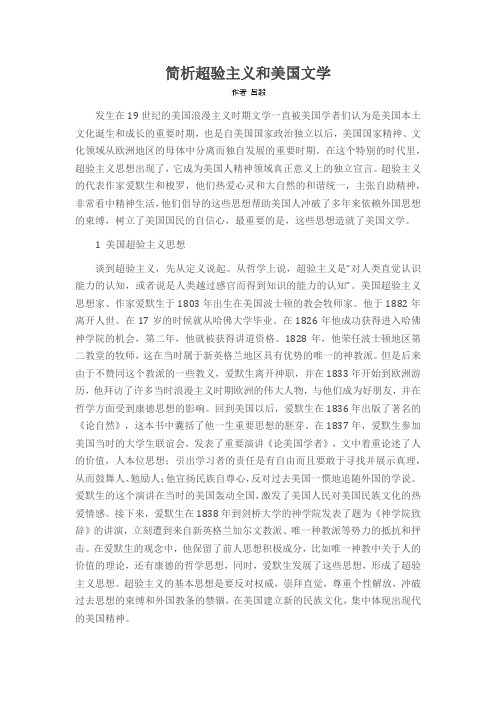
简析超验主义和美国文学发生在19世纪的美国浪漫主义时期文学一直被美国学者们认为是美国本土文化诞生和成长的重要时期,也是自美国国家政治独立以后,美国国家精神、文化领域从欧洲地区的母体中分离而独自发展的重要时期。
在这个特别的时代里,超验主义思想出现了,它成为美国人精神领域真正意义上的独立宣言。
超验主义的代表作家爱默生和梭罗,他们热爱心灵和大自然的和谐统一,主张自助精神,非常看中精神生活,他们倡导的这些思想帮助美国人冲破了多年来依赖外国思想的束缚,树立了美国国民的自信心,最重要的是,这些思想造就了美国文学。
1 美国超验主义思想谈到超验主义,先从定义说起。
从哲学上说,超验主义是“对人类直觉认识能力的认知,或者说是人类越过感官而得到知识的能力的认知”。
美国超验主义思想家、作家爱默生于1803年出生在美国波士顿的教会牧师家。
他于1882年离开人世。
在17岁的时候就从哈佛大学毕业。
在1826年他成功获得进入哈佛神学院的机会,第二年,他就被获得讲道资格。
1828年,他荣任波士顿地区第二教堂的牧师,这在当时属于新英格兰地区具有优势的唯一的神教派。
但是后来由于不赞同这个教派的一些教义,爱默生离开神职,并在1833年开始到欧洲游历,他拜访了许多当时浪漫主义时期欧洲的伟大人物,与他们成为好朋友,并在哲学方面受到康德思想的影响。
回到美国以后,爱默生在1836年出版了著名的《论自然》,这本书中囊括了他一生重要思想的胚芽。
在1837年,爱默生参加美国当时的大学生联谊会,发表了重要演讲《论美国学者》,文中着重论述了人的价值,人本位思想;引出学习者的责任是有自由而且要敢于寻找并展示真理,从而鼓舞人、勉励人;他宣扬民族自尊心,反对过去美国一惯地追随外国的学说。
爱默生的这个演讲在当时的美国轰动全国,激发了美国人民对美国民族文化的热爱情感。
接下来,爱默生在1838年到剑桥大学的神学院发表了题为《神学院致辞》的讲演,立刻遭到来自新英格兰加尔文教派、唯一种教派等势力的抵抗和抨击。
爱默生美国文学鼻祖的超验主义思想

爱默生美国文学鼻祖的超验主义思想在19世纪的美国文学史上,拉尔夫·瓦尔多·爱默生(Ralph Waldo Emerson)是一位不可忽视的重要人物。
他被誉为美国文学的鼻祖,是超验主义思想的先驱。
本文将探讨爱默生的超验主义思想以及其在美国文学中的影响。
一、超验主义的核心思想超验主义是19世纪美国文学与哲学的重要思潮之一,强调个体意识的自由思考和直觉,并体现了对自然界的崇拜和对人类心灵与自然的融合。
爱默生认为,每个人都可以通过直接的直觉和某些心灵的洞察力来认识真理,而不必完全依赖于逻辑推理。
其次,超验主义还注重个体与社会的关系。
爱默生主张人们应该有勇气表达自我,摆脱传统的束缚,寻找自己独特的价值和使命。
他认为每个人都是独一无二的,都具有独特的天赋和才华,应该追求个体的独立和自由。
二、超验主义在爱默生的作品中的体现1.《自然》《自然》是爱默生最具代表性的著作之一,也是他超验主义思想的宣言。
在这本书中,爱默生探讨了自然界与人类之间的关系,并认为直接感知自然可以带来心灵上的平静和启迪。
他强调自然是一本巨大的书籍,宇宙是一个大教堂,人们应该去观察、思考和感知自然的奥秘。
2.《论自我》《论自我》是爱默生的另一部重要著作,他在其中解释了个人与自我之间的关系。
他认为自我是一个独特的存在,是与众不同的。
爱默生主张个体应该追寻内心的真实自我,摆脱社会的期望和价值观的束缚,勇敢地践行自我。
3.诗歌作品爱默生不仅是一位哲学家和思想家,还是一位才华横溢的诗人。
他的诗歌作品通常以叙述真实的自然景观和探索个体内心起伏的情感为主题。
他的诗歌作品深受超验主义思想的影响,强调直觉和感知的力量,表达了对自然界美的赞美和对人类精神的探索。
三、超验主义对美国文学的影响爱默生的超验主义思想对美国文学产生了深远的影响。
它鼓励作家勇敢地探索内心世界和直觉的力量,寻找个人的独特价值和使命。
超验主义思想促使作家们拒绝传统的形式和约束,追求写作的自由和创新,对美国文学带来了新的思维模式和艺术风格。
美国文学 超验主义

Important terms (1)
Although transcendentalism was never a rigorously systematic philosophy, it had some basic tenets that were generally shared by its adherents. The beliefs that God is immanent in each person and in nature(每人都有内在的神性) and that individual intuition is the highest source of knowledge led to an optimistic emphasis on individualism, self-reliance, and rejection of traditional authority.
Important features of New England Transcendentalism (2)
It was also a reaction against the process of dehumanization (磨灭人性)that came in the wake of developing capitalism. The industrialization of New England was turning men into nonhumans. People were losing their individuality and were becoming uniform. The Transcendentalists saw the process in progress and, by trying to reassert the importance of the individual, emphasized the significance of men regaining their lost personality.
美国文学名词解释 -
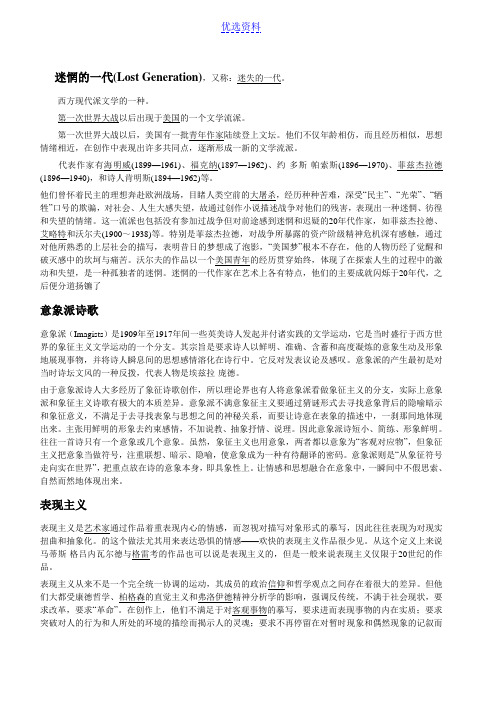
迷惘的一代(Lost Generation),又称:迷失的一代。
西方现代派文学的一种。
第一次世界大战以后出现于美国的一个文学流派。
第一次世界大战以后,美国有一批青年作家陆续登上文坛。
他们不仅年龄相仿,而且经历相似,思想情绪相近,在创作中表现出许多共同点,逐渐形成一新的文学流派。
代表作家有海明威(1899—1961)、福克纳(1897—1962)、约·多斯·帕索斯(1896—1970)、菲兹杰拉德(1896—1940),和诗人肯明斯(1894—1962)等。
他们曾怀着民主的理想奔赴欧洲战场,目睹人类空前的大屠杀,经历种种苦难,深受“民主”、“光荣”、“牺牲”口号的欺骗,对社会、人生大感失望,故通过创作小说描述战争对他们的残害,表现出一种迷惘、彷徨和失望的情绪。
这一流派也包括没有参加过战争但对前途感到迷惘和迟疑的20年代作家,如菲兹杰拉德、艾略特和沃尔夫(1900~1938)等。
特别是菲兹杰拉德,对战争所暴露的资产阶级精神危机深有感触,通过对他所熟悉的上层社会的描写,表明昔日的梦想成了泡影,“美国梦”根本不存在,他的人物历经了觉醒和破灭感中的坎坷与痛苦。
沃尔夫的作品以一个美国青年的经历贯穿始终,体现了在探索人生的过程中的激动和失望,是一种孤独者的迷惘。
迷惘的一代作家在艺术上各有特点,他们的主要成就闪烁于20年代,之后便分道扬镳了意象派诗歌意象派(Imagists)是1909年至1917年间一些英美诗人发起并付诸实践的文学运动,它是当时盛行于西方世界的象征主义文学运动的一个分支。
其宗旨是要求诗人以鲜明、准确、含蓄和高度凝炼的意象生动及形象地展现事物,并将诗人瞬息间的思想感情溶化在诗行中。
它反对发表议论及感叹。
意象派的产生最初是对当时诗坛文风的一种反拨,代表人物是埃兹拉·庞德。
由于意象派诗人大多经历了象征诗歌创作,所以理论界也有人将意象派看做象征主义的分支,实际上意象派和象征主义诗歌有极大的本质差异。
美国文学第二部分:超验主义的丰碑艾默生
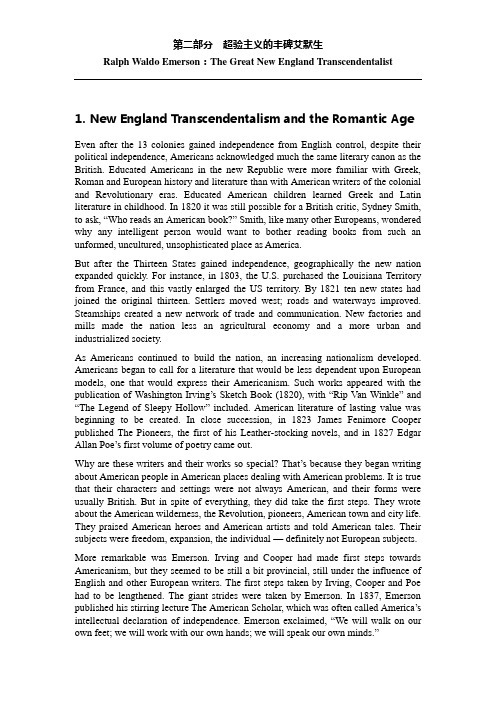
1.New England Transcendentalism and the Romantic AgeEven after the 13 colonies gained independence from English control, despite their political independence, Americans acknowledged much the same literary canon as the British. Educated Americans in the new Republic were more familiar with Greek, Roman and European history and literature than with American writers of the colonial and Revolutionary eras. Educated American children learned Greek and Latin literature in childhood. In 1820 it was still possible for a British critic, Sydney Smith, to ask, “Who reads an American book?” Smith, like many other Europeans, wondered why any intelligent person would want to bother reading books from such an unformed, uncultured, unsophisticated place as America.But after the Thirteen States gained independence, geographically the new nation expanded quickly. For instance, in 1803, the U.S. purchased the Louisiana Territory from France, and this vastly enlarged the US territory. By 1821 ten new states had joined the original thirteen. Settlers moved west; roads and waterways improved. Steamships created a new network of trade and communication. New factories and mills made the nation less an agricultural economy and a more urban and industrialized society.As Americans continued to build the nation, an increasing nationalism developed. Americans began to call for a literature that would be less dependent upon European models, one that would express their Americanism. Such works appeared with the publication of Washington Irving’s Sketch Book(1820), with “Rip Van Winkle” a nd “The Legend of Sleepy Hollow” included. American literature of lasting value was beginning to be created. In close succession, in 1823 James Fenimore Cooper published The Pioneers, the first of his Leather-stocking novels, and in 1827 Edgar Allan Poe’s first volume of poetry came out.Why are these writers and their works so special? That’s because they began writing about American people in American places dealing with American problems. It is true that their characters and settings were not always American, and their forms were usually British. But in spite of everything, they did take the first steps. They wrote about the American wilderness, the Revolution, pioneers, American town and city life. They praised American heroes and American artists and told American tales. Their subjects were freedom, expansion, the individual — definitely not European subjects. More remarkable was Emerson. Irving and Cooper had made first steps towards Americanism, but they seemed to be still a bit provincial, still under the influence of English and other European writers. The first steps taken by Irving, Cooper and Poe had to be lengthened. The giant strides were taken by Emerson. In 1837, Emerson published his stirring lecture The American Scholar, which was often call ed America’s intellectual declaration of independence. Emerson exclaimed, “We will walk on our own feet; we will work with our own hands; we will speak our own minds.”The nation listened and took the words to heart. Increasingly, American writers began to free themselves from European models. During a relatively few years, concentrating around Boston and the village of Concord, a number of writers appeared. We now think of them as “classic” writers. Such writers as Ralph Waldo Emerson, Nathaniel Hawthorne, Henry David Thoreau, Herman Melville, Walt Whitman, Emily Dickinson,collectively brought about the Renaissance of New England.We say these writers are great because for many readers their work has a vitality and originality that endures, that transcends time and place.Ralph Waldo Emerson: The giant of American TranscendentalismBorn in Boston, Ralph Waldo Emerson was the son of a Unitarian minister who died when Waldo was 8 years old. He attended Harvard, studied theology, and became a Unitarian minister himself in 1829.Emerson’s dedication to the ministry was to a life of public service through eloquence, not to a life of preserving and disseminating religious dogma. Emerson’s skepticism toward Christianity was strengthened by his exposure to the German “higher criticism.”1In 1832, for reasons of conscience, Emerson resigned his ministry and sailed to Europe.In Europe he met the English writers Wordsworth, Coleridge and Carlyle.After returning from Europe, he settled in the village of Concord, Massachusetts and began his lifelong career as lecturer and writer. It was at Concord that Emerson composed his first book, Nature (1936). His address called The American Scholar (1937) has been an inspiration to generations of young Americans, but Emerson did not achieve national fame until his Essays appeared in 1841. Then came Essays: Second Series (1844), Representative Men (1849), and The Conduct of Life (1860). When he was a young man, Emerson began writing journals and taking notes. In his journals he would write down his daily thoughts and observations. In his note-books he would put down notes on his wide reading. He called these journals and notebooks his “Savings Bank”, from which he would “withdraw” the language and ideas for lectures. With many deliveries, the lectures became polished and improved, then often became the basis for his essays. And in turn, these essays were important influences upon so many American writers, including Thoreau, Whitman, Dickinson, and Frost. Modern literary historians see Emerson as the seminal writer of the century.1Higher criticism is t he name given in the 19th century to a branch of biblical scholarship concerned with establishing the dates, authorship, sources, and interrelations of the various books of the Bible, often with disturbing results for orthodox Christian dogma. It was “higher” not in status but in the sense that it required a preliminary basis of “lower” textual criticism, which reconstructed the original wording of biblical texts from faulty copies. (高等考证,指用科学方法对基督教《圣经》各书的作者、写作日期、写作目的等所作的考证)Yet Emerson’s great influence extended beyond the literary community and went to the American people at large. His optimism, his belief in the vast possibilities of mind and spirit, and his doctrine of self-reliance well suited a democratic, progressive nation.Nature is one of Emerson’s best-known and most influential essays. It is a lyrical expression of the harmony Emerson felt between himself and nature.NatureIntroduction (excerpt)Our age is retrospective(回顾的). It builds the sepulchers(坟墓)of the fathers. It writes biographies, histories, and criticism. The foregoing generations beheld God and nature face to face; we, through their eyes. Why should not we also enjoy an original relation to the universe? Why should not we have a poetry and philosophy of insight and not of tradition, and a religion by revelation to us, and not the history of theirs? Embosomed(环绕)for a season in nature, whose floods of life stream around and through us, and invite us by the powers they supply, to action proportioned to nature, why should we grope among the dry bones of the past, or put the living generation into masquerade(化装舞会)out of its faded wardrobe? The sun shines to-day also. There is more wool and flax in the fields. There are new lands, new men, new thoughts. Let us demand our own works and laws and worship.Chapter I (Excerpt)To go into solitude, a man needs to retire as much from his chamber as from society. I am not solitary whilst I read and write, though nobody is with me. But if a man would be alone, let him look at the stars. The rays that come from those heavenly worlds will separate between him and what he touches. One might think the atmosphere was made transparent with this design, to give man, in the heavenly bodies, the perpetual presence of the sublime(崇高). Seen in the streets of cities, how great they are! If the stars should appear one night in a thousand years, how would men believe and adore; and preserve for many generations the remembrance of the city of God which had been shown! But every night come out these envoys(使者)of beauty, and light the universe with their admonishing(微微责备的)smile.The stars awaken a certain reverence, because though always present, they are inaccessible; but all natural objects make a kindred impression, when the mind is open to their influence. Nature never wears a mean appearance. Neither does the wisest man extort her secret, and lose his curiosity by finding out all her perfection. Nature never became a toy to a wise spirit. The flowers, the animals, the mountains, reflectedthe wisdom of his best hour, as much as they had delighted the simplicity of his childhood. When we speak of nature in this manner, we have a distinct but most poetical sense in the mind. We mean the integrity(完整,完善)of impression made by manifold(多种多样的)natural objects. It is this which distinguishes the stick of timber of the wood-cutter, from the tree of the poet. The charming landscape which I saw this morning, is indubitably made up of some twenty or thirty farms. Miller owns this field, Locke that, and Manning the woodland beyond. But none of them owns the landscape. There is a property in the horizon which no man has but he whose eye can integrate(使结合成为整体)all the parts, that is, the poet. This is the best part of these men's farms, yet to this their warranty-deeds(地契)give no title.To speak truly, few adult persons can see nature. Most persons do not see the sun. At least they have a very superficial seeing. The sun illuminates only the eye of the man, but shines into the eye and the heart of the child. The lover of nature is he whose inward and outward senses are still truly adjusted to each other; who has retained the spirit of infancy even into the era of manhood. His intercourse with heaven and earth, becomes part of his daily food. In the presence of nature, a wild delight runs through the man, in spite of real sorrows. Nature says: He is my creature, and maugre (不管) all his impertinent(不合理的)griefs, he shall be glad with me. Not the sun or the summer alone, but every hour and season yields its tribute of delight; for every hour and change corresponds to and authorizes a different state of the mind, from breathless noon to grimmest midnight. Nature is a setting that fits equally well a comic or a mourning piece. In good health, the air is a cordial(兴奋剂)of incredible virtue. Crossing a bare common, in snow puddles, at twilight, under a clouded sky, without having in my thoughts any occurrence of special good fortune, I have enjoyed a perfect exhilaration(愉悦). I am glad to the brink of fear. In the woods too, a man casts off his years, as the snake his slough([slΛf]蛇蜕皮), and at what period soever of life, is always a child. In the woods, is perpetual youth. Within these plantations of God, a decorum(端庄得体)and sanctity(圣洁)reign, a perennial festival is dressed, and the guest sees not how he should tire of them in a thousand years. In the woods, we return to reason and faith. There I feel that nothing can befall me in life—no disgrace, no calamity, (leaving me my eyes,) which nature cannot repair. Standing on the bare ground— my head bathed by the blithe(无忧无虑的)air, and uplifted into infinite space—all mean egotism vanishes. I become a transparent eye-ball; I am nothing; I see all; the currents of the Universal Being circulate through me; I am part or particle of God. The name of the nearest friend sounds then foreign and accidental: to be brothers, to be acquaintances, master or servant, is then a trifle and a disturbance.I am the lover of uncontained and immortal beauty. In the wilderness, I find something more dear and connate(天生的)than in streets or villages. In the tranquil landscape, and especially in the distant line of the horizon, man beholds somewhat as beautiful as his own nature.The greatest delight which the fields and woods minister(提供), is the suggestion of an occult(玄妙的)relation between man and the vegetable. I am not alone and unacknowledged. They nod to me, and I to them. The waving of the boughs in the storm, is new to me and old. It takes me by surprise, and yet is not unknown. Its effectis like that of a higher thought or a better emotion coming over me, when I deemed I was thinking justly or doing right.Yet it is certain that the power to produce this delight, does not reside in nature, but in man, or in a harmony of both. It is necessary to use these pleasures with great temperance. For, nature is not always tricked(打扮)in holiday attire, but the same scene which yesterday breathed perfume and glittered as for the frolic(嬉戏)of the nymphs(仙女,精灵), is overspread with melancholy today. Nature always wears the colors of the spirit. To a man laboring under calamity, the heat of his own fire hath sadness in it. Then, there is a kind of contempt of the landscape felt by him who has just lost by death a dear friend. The sky is less grand as it shuts down over less worth in the population.STUDY QUESTIONSRecallingHow does Emerson describe the lover of nature?ExtendingWhat do you think is the difference between the kind of meaning Emerson finds in nature and the meaning a botanist, a geographer, or an astrophysicist finds in nature?The American Scholar (excerpt)Each age, it is found, must write its own books; or rather, each generation for the next succeeding. The books of an older period will not fit this……Meek young men grow up in libraries believing it their duty to accept the views which Cicero2, which Locke3, which Bacon4 have given, forgetful that Cicero, Locke, and Bacon were only young men in libraries when they wrote these books.Hence, ins tead of Man Thinking we have the bookworm……2Cicero (106-43 BC,西塞罗),a Roman philosopher, statesman, lawyer, orator, political theorist, consul and constitutionalist. He is widely considered one of Rome’s greatest orators and prose stylists.3J ohn Locke (1632-1704, 洛克), an English philosopher and physician regarded as one of the most influential of Enlightenment thinkers.4Francis Bacon (1561-1626), an English philosopher, statesman, scientist, jurist, and author. Although his political career ended in disgrace, he remained extremely influential through his works, especially as philosophical advocate and practitioner of the Scientific method during the scientific revolution.Books are the best of things, well used; abused, among the worst. What is the right use? ……They are for nothing but to inspire. I had better never see a book, than to be warped(使弯曲,使不正常) by its attraction clean out of my own orbit, and made a satellite instead of a system. The one thing in the world, of value(有价值的), is the active soul. This every man is entitled to; this every man contains within him, although, in almost all men, obstructed(阻塞), and as yet unborn. The soul active sees absolute truth; and utters truth, or creates……But genius looks forward; the eyes of man are set in his forehead, not in his hindhead; man hopes; genius creates…………Genius is always sufficiently the enemy of genius by over-influence. The literature of every nation bears me witness. The English dramatic poets have Shakespearized now for two hundred years……Undoubtedly there is a right way of reading, so it be sternly subordinated(从属的). Man Thinking must not be subdued by his instru ments. Books are for the scholar’s idle times. When we can read God directly, the hour is too precious to be wasted in other men’s transcripts(誊本)of their readings.Of course, there is a portion of reading quite indispensable to a wise man. History and exact science he must learn by laborious([ləˈbɔ:riəs])reading. Colleges, in like manner, have their indispensable office(职责,功能),—to teach elements. But they can only highly serve us when they aim not to drill, but to create; when they gather from far every ray of various genius to their hospitable halls, and, by the concentrated fires, set the hearts of their youth on flame. Thought and knowledge are natures in which apparatus(实验器具,设备)and pretension(虚名)avail nothing. Gowns(大学师生), and pecuniary(金钱的) foundations, though of towns of gold, can never countervail(弥补)the least sentence or syllable of wit. Forget this, and our American colleges will recede(倒退)in their public importance, whilst they grow richer every year.。
- 1、下载文档前请自行甄别文档内容的完整性,平台不提供额外的编辑、内容补充、找答案等附加服务。
- 2、"仅部分预览"的文档,不可在线预览部分如存在完整性等问题,可反馈申请退款(可完整预览的文档不适用该条件!)。
- 3、如文档侵犯您的权益,请联系客服反馈,我们会尽快为您处理(人工客服工作时间:9:00-18:30)。
超验主义和美国文学
摘要:美国超验主义出现在美国浪漫主义时期的中后期,以爱默生和梭罗为代表,他们的思想彻底改变了美国文学,激励了美国的文学和文化发展,意义深远。
关键词:爱默生超验主义美国文学
中图分类号:g64 文献标识码:a 文章编号:1673-9795(2012)09(b)-0155-01
发生在19世纪的美国浪漫主义时期文学一直被美国学者们认为是美国本土文化诞生和成长的重要时期,也是自美国国家政治独立以后,美国国家精神、文化领域从欧洲地区的母体中分离而独自发展的重要时期。
在这个特别的时代里,超验主义思想出现了,它成为美国人精神领域真正意义上的独立宣言。
超验主义的代表作家爱默生和梭罗,他们热爱心灵和大自然的和谐统一,主张自助精神,非常看中精神生活,他们倡导的这些思想帮助美国人冲破了多年来依赖外国思想的束缚,树立了美国国民的自信心,最重要的是,这些思想造就了美国文学。
1 美国超验主义思想
谈到超验主义,先从定义说起。
从哲学上说,超验主义是“对人类直觉认识能力的认知,或者说是人类越过感官而得到知识的能力的认知”。
美国超验主义思想家、作家爱默生于1803年出生在美国波士顿的教会牧师家。
他于1882年离开人世。
在17岁的时候就从哈佛大学毕业。
在1826年他成功获得进入哈佛神学院的机会,
第二年,他就被获得讲道资格。
1828年,他荣任波士顿地区第二教堂的牧师,这在当时属于新英格兰地区具有优势的唯一的神教派。
但是后来由于不赞同这个教派的一些教义,爱默生离开神职,并在1833年开始到欧洲游历,他拜访了许多当时浪漫主义时期欧洲的伟大人物,与他们成为好朋友,并在哲学方面受到康德思想的影响。
回到美国以后,爱默生在1836年出版了著名的《论自然》,这本书中囊括了他一生重要思想的胚芽。
在1837年,爱默生参加美国当时的大学生联谊会,发表了重要演讲《论美国学者》,文中着重论述了人的价值,人本位思想;引出学习者的责任是有自由而且要敢于寻找并展示真理,从而鼓舞人、勉励人;他宣扬民族自尊心,反对过去美国一惯地追随外国的学说。
爱默生的这个演讲在当时的美国轰动全国,激发了美国人民对美国民族文化的热爱情感。
接下来,爱默生在1838年到剑桥大学的神学院发表了题为《神学院致辞》的讲演,立刻遭到来自新英格兰加尔文教派、唯一种教派等势力的抵抗和抨击。
在爱默生的观念中,他保留了前人思想积极成分,比如唯一神教中关于人的价值的理论,还有康德的哲学思想,同时,爱默生发展了这些思想,形成了超验主义思想。
超验主义的基本思想是要反对权威,崇拜直觉,尊重个性解放,冲破过去思想的束缚和外国教条的禁锢,在美国建立新的民族文化,集中体现出现代的美国精神。
爱默生和他的学生梭罗为新思想的传播在美国努力奔走着,但在当时还是有很多人无法立即接受新思想,但是随着时间的推移,
新思想被越来越多的人了解和理解,最后逐步成为当时美国的主流思想。
超验主义思想主要体现在三个大的方面:第一,超验主义认为精神的力量是第一位的,这是整个宇宙中最重要的因素。
第二,超验主义提倡用全新的目光去审视自然,他们认为自然才是精神的象征,自然是对人类最神圣和纯洁的思想,主张人们用自己的直觉去感受自然界中无处不在的上帝。
第三,美国超验主义认为个人的重要性是第一位的。
这个社会中最重要的组成因素是个人,通过个人的修养完善才能实现社会的革新。
所以我们每个人最主要的任务和责任是自我完备,而不是过去崇尚的只追求物质富贵。
2 超验主义与美国文学
美国的超验主义思想帮助美国文学由原先地依赖国外逐渐走向独立。
美国文学是美国本土文化形成的一个重要证明。
爱默生是超验主义的缔造者,同时也是美国本国文化独立的积极推动者,他最大的功绩就在于他在美国文学上的贡献,也就是他对于美国民族文学的影响。
他是第一个提出精神至上,冲破以往以神为中心的古老思想,认定人只要凭借自己的直觉是可以认识真理的,所以在一定程度上可以说人就是上帝本身,这个思想不仅仅肯定了人的作用,同时它强调了人的价值。
爱默生还主张解放个性,挑战权威。
爱默生认为,学习国外的思想理念模式肯定有必要,有益处,但是,不能一味的,毫无改变地,盲目跟风似的追随,那样做会成为了另一个模式,总之不会自己,从而失去了美国民族文化的根本,坚持自
己比一切都重要。
他在另一篇文章《论自然》中提到,“一定要坚持自己的东西,而不是一味模仿别人。
”这种思想逐渐被人们广为接受,并将当时的美国,政治和经济上完全独立的美国,在文化和精神上从欧洲大陆的文化束缚中彻底解脱出来,使美国文学从此以一个独立的形象屹立在世界。
爱默生还劝告学者们,要摒弃学究气,放弃纯粹的摹仿和信从。
他的言论被当时美国的学者们视为“美国思想的独立宣言”。
爱默生谈到美国文学独立的必要性和必然性,他说:“我们依赖于人的日子,我们心智向其他大陆智慧学习的学徒期,该结束了。
成百万簇拥着我们涌向生活的同胞,他们不可能永远的满于食用外国智慧收获的陈粮。
全新的事件和行为在发生中,这一切都需要被歌唱,它们自己也要歌唱自己。
”在爱默生的眼中,美国,美国民族,应当自立,自立在世界之上,要实现这个目标,需要做到的是自助自立。
而这其中有两方面是非常重要的,第一是不要去一味“迎合”,要考虑到自己国家的实际情况,具体问题具体分析,学会变通;第二,要实现这个目标,需要相信世界上的每个人都是有他的优势和伟大之处的,要善于发现和挖掘自身的伟大潜力。
过去的效仿就是在迷失自我,应该做的是把注意力放在当下,臣服于当下,比任何时候都要相信自己的直觉。
超验主义思想在当时将浪漫时期的美国文学彻底推向高潮,涌现出大批突出美国个性和独立的美国作家,美国文学真正意义上独立起来。
爱默生和梭罗号召人们相信“直觉”,不再依赖任何人和
固有的文化知识,提倡个性发展。
爱默生还认为美的真正目的,不是模仿,而是创造。
他特别主张在文学作品中用“目前的、平凡的、低贱的”新题材,主张美国文学民族化,独立化。
“我们要用自己的脚走路,我们要用自己的手工作,我们要发表自己的意见”。
这些思想真实地反映了当时美国大众追求民族文化和文学的强烈愿望,而且还集中表达了美国人想要冲破传统束缚、解放思想的进步立场。
爱默生的思想对于美国民族文学和文化的发展起到了非常积极的推动作用。
总而言之,爱默生发起和倡导的超验主义思想,以美国精神独立宣言的身份,对美国文学的影响深远广泛。
最重要的成就是塑造了独立的美国文学。
